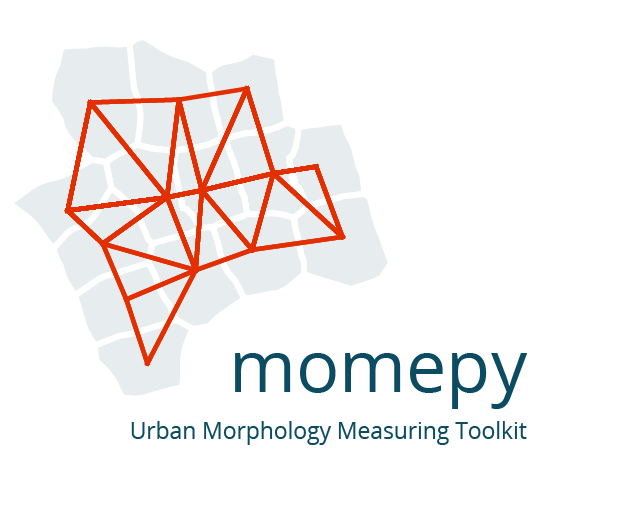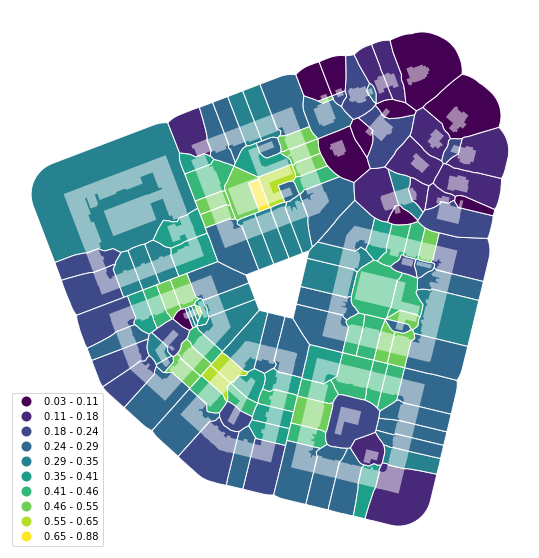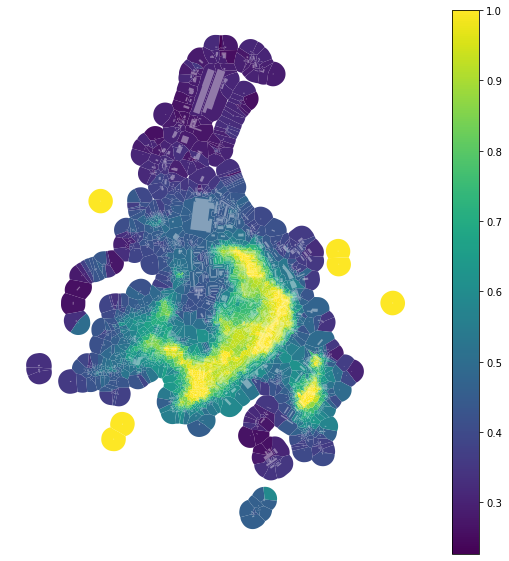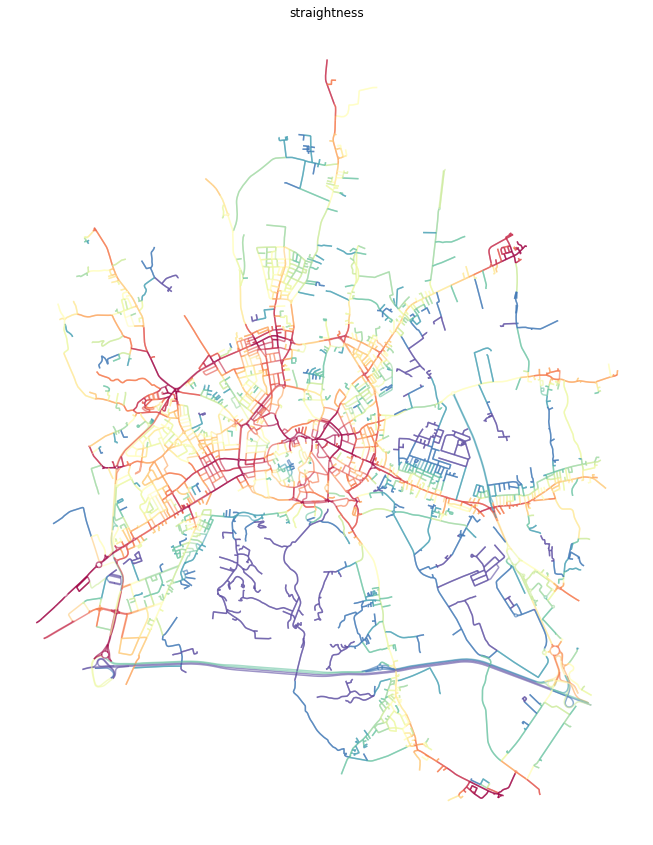Urban Morphology Measuring Toolkit
Project description
momepy

Introduction
Momepy is a library for quantitative analysis of urban form - urban morphometrics. It is part of PySAL (Python Spatial Analysis Library) and is built on top of GeoPandas, other PySAL modules and networkX.
momepy stands for Morphological Measuring in Python
Some of the functionality that momepy offers:
- Measuring dimensions of morphological elements, their parts, and aggregated structures.
- Quantifying shapes of geometries representing a wide range of morphological features.
- Capturing spatial distribution of elements of one kind as well as relationships between different kinds.
- Computing density and other types of intensity characters.
- Calculating diversity of various aspects of urban form.
- Capturing connectivity of urban street networks
- Generating relational elements of urban form (e.g. morphological tessellation)
Momepy aims to provide a wide range of tools for a systematic and exhaustive analysis of urban form. It can work with a wide range of elements, while focused on building footprints and street networks.
Comments, suggestions, feedback, and contributions, as well as bug reports, are very welcome.
The package is currently maintained by @martinfleis and @jGaboardi.
Getting Started
Quick and easy getting started guide is part of the User Guide.
Documentation
Documentation of momepy is available at docs.momepy.org.
Examples
coverage = momepy.AreaRatio(tessellation, buildings, left_areas=tessellation.area,
right_areas='area', unique_id='uID')
tessellation['CAR'] = coverage.series
area_simpson = momepy.Simpson(tessellation, values='area',
spatial_weights=sw3,
unique_id='uID')
tessellation['area_simpson'] = area_simpson.series
G = momepy.straightness_centrality(G)
How to cite
To cite momepy please use following software paper published in the JOSS.
Fleischmann, M. (2019) ‘momepy: Urban Morphology Measuring Toolkit’, Journal of Open Source Software, 4(43), p. 1807. doi: 10.21105/joss.01807.
BibTeX:
@article{fleischmann_2019,
author={Fleischmann, Martin},
title={momepy: Urban Morphology Measuring Toolkit},
journal={Journal of Open Source Software},
year={2019},
volume={4},
number={43},
pages={1807},
DOI={10.21105/joss.01807}
}
Install
You can install momepy using Conda from conda-forge (recommended):
conda install -c conda-forge momepy
or from PyPI using pip:
pip install momepy
See the installation instructions for detailed instructions. Momepy depends on python geospatial stack, which might cause some dependency issues.
Contributing to momepy
Contributions of any kind to momepy are more than welcome. That does not mean new code only, but also improvements of documentation and user guide, additional tests (ideally filling the gaps in existing suite) or bug report or idea what could be added or done better.
All contributions should go through our GitHub repository. Bug reports, ideas or even questions should be raised by opening an issue on the GitHub tracker. Suggestions for changes in code or documentation should be submitted as a pull request. However, if you are not sure what to do, feel free to open an issue. All discussion will then take place on GitHub to keep the development of momepy transparent.
If you decide to contribute to the codebase, ensure that you are using an up-to-date main branch. The latest development version will always be there, including the documentation (powered by sphinx).
Details are available in the documentation.
Get in touch
If you have a question regarding momepy, feel free to open an issue or a new discussion on GitHub.
Acknowledgements
Initial release of momepy was a result of a research of Urban Design Studies Unit (UDSU) supported by the Axel and Margaret Ax:son Johnson Foundation as a part of “The Urban Form Resilience Project” in partnership with University of Strathclyde in Glasgow, UK. Further development was supported by Geographic Data Science Lab of the University of Liverpool wihtin Urban Grammar AI research project.
Copyright (c) 2018-, Martin Fleischmann and PySAL Developers
Project details
Release history Release notifications | RSS feed
Download files
Download the file for your platform. If you're not sure which to choose, learn more about installing packages.
Source Distribution
Built Distribution
File details
Details for the file momepy-0.5.4.tar.gz.
File metadata
- Download URL: momepy-0.5.4.tar.gz
- Upload date:
- Size: 256.7 kB
- Tags: Source
- Uploaded using Trusted Publishing? No
- Uploaded via: twine/4.0.1 CPython/3.9.14
File hashes
| Algorithm | Hash digest | |
|---|---|---|
| SHA256 | 0160fccfe92f7acb15cd5a2e4ff855c989f34b9afe6c4c5060d082ff97895d4f |
|
| MD5 | 1bd9b0409030a843937e463ffa244aa8 |
|
| BLAKE2b-256 | b0a428573edee1b20f749549e98677bdea004b9b788ddd867cd99f541d7e3797 |
Provenance
File details
Details for the file momepy-0.5.4-py3-none-any.whl.
File metadata
- Download URL: momepy-0.5.4-py3-none-any.whl
- Upload date:
- Size: 243.7 kB
- Tags: Python 3
- Uploaded using Trusted Publishing? No
- Uploaded via: twine/4.0.1 CPython/3.9.14
File hashes
| Algorithm | Hash digest | |
|---|---|---|
| SHA256 | 8fb000b4bb508c73bfc959d91fb63022ae6ee8baf9709ecf5a71da1c2642cf3b |
|
| MD5 | c7540ca8df9febceefa00bcd2e0618bc |
|
| BLAKE2b-256 | 6a00af4215b55a4a365447b7d029535231bc05b592474c834ab7153cbf9261ec |




















